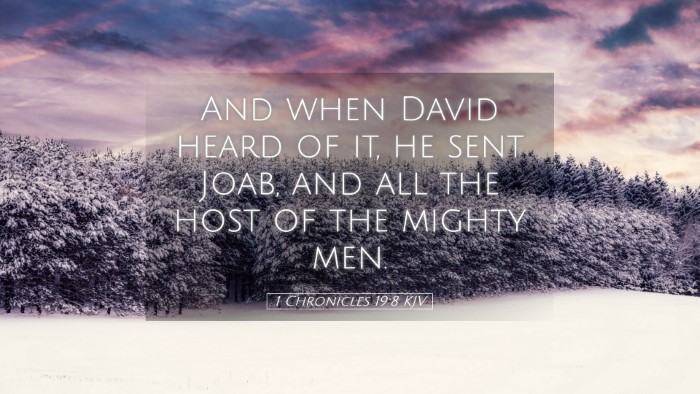Commentary on 1 Chronicles 19:8
Verse: "When David heard of it, he sent Joab and all the host of the mighty men." (1 Chronicles 19:8)
Contextual Overview
This verse is located within a narrative that recounts the geopolitical tensions surrounding David's reign. The background involves the Ammonites, who, after the death of their king Nahash, show dishonor to David by refusing to accept his kindness. Consequently, this led to a military response from David, reflected in this verse.
Commentary Insights
Matthew Henry's Commentary
Henry emphasizes the significance of David’s actions in sending Joab. His choice of Joab, a seasoned and capable military leader, indicates David’s pragmatic approach to warfare. Joab represents not only military might but also David's trust in capable leaders to handle dire situations. David responding promptly to the provocation signifies his understanding of leadership and the necessity of maintaining his kingship’s honor against any affront.
Albert Barnes' Notes
Barnes elaborates on the dynamics between David and the Ammonites, noting that David's earlier kindness was met with ungratefulness. He views Joab's leadership as a crucial factor in the unfolding conflict. Barnes also sees this incident as a foreshadowing of future battles and the ever-present need for Israel’s king to assert authority. The deployment of the "mighty men" signifies the serious nature of the threat and demonstrates the readiness of Israel's forces to confront adversaries.
Adam Clarke's Commentary
Clarke dives into the motivations behind David’s military action, suggesting that David's decision to send Joab was a strategic move to quell the insurrection and restore peace. He stresses the importance of maintaining integrity and a visible response to insults, as sometimes a passive stance could be interpreted as weakness. Clarke also reflects on the contrast between David’s mercy with the Ammonites and their subsequent aggression, highlighting a moral imperative for leaders to prioritize justice.
Theological Significance
The actions of David as described in this verse prompt significant theological reflections on leadership, authority, and the moral responsibilities that accompany power. David’s responsiveness reveals a key characteristic of godly leadership—courage to confront evil and protect the integrity of one’s position. This stance invites leaders, both in church and secular domains, to evaluate how they respond to challenges and insults.
Application for Pastors, Students, and Theologians
- Leadership Lessons: Examine how David's approach can inform modern-day leaders about the importance of responding to injustice and challenges to authority.
- Understanding Conflict: Reflect on the nature of conflicts in ministry and how they can be handled with both wisdom and strength, inspired by David’s resolve.
- Moral Integrity: Highlight the importance of maintaining moral integrity as leaders. David's mercy was met with hostility, prompting a reminder that compassion can sometimes be mistaken for weakness.
- Consequences of Actions: Discuss the consequences of diplomatic engagements. David's initial kindness was turned against him, prompting deeper discussion on how engagement in one sphere could lead to conflict in another.
Conclusion
1 Chronicles 19:8 encapsulates a critical moment in David’s reign, illustrating the complexities of leadership, the interplay of mercy and conflict, and the ongoing struggles leaders face in navigating relationships with adversaries. Through the insights drawn from Henry, Barnes, and Clarke, we gain a comprehensive understanding of the verse’s implications for contemporary leadership within the church and wider society.


